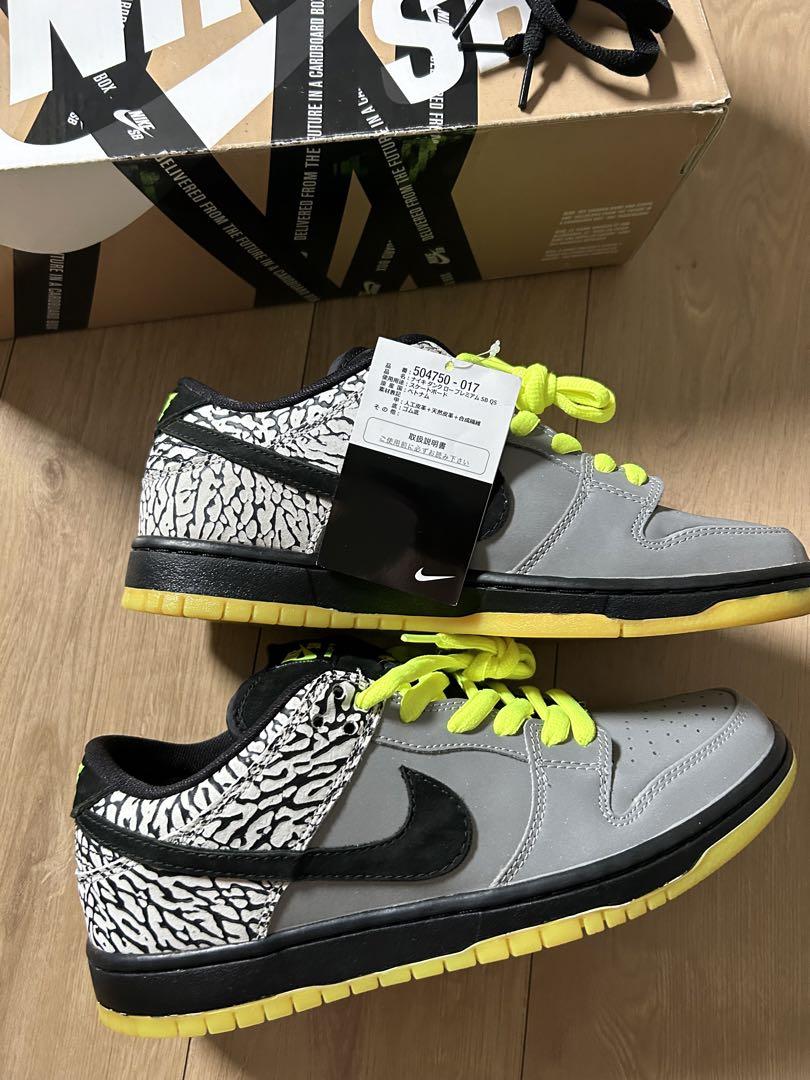ravis Scott × Nike Air Jordan 1 Olive 〈新品・未使用〉 [Z0923112731]
ravis Scott × Nike Air Jordan 1 Olive
[Z0923112731]
販売価格: 41400円(税込)
商品詳細
メインカラー···グリーン
気軽に値下げ交渉承っております。
ravis Scott × Nike Air Jordan 1 Olive
こちらにて購入しましたが金欠のため泣く泣く出品となります。付属品と箱。包装紙全て揃っております。スニダンの鑑定済みタグもあります。
他でも出品しているため購入の際はコメントしてからよろしくお願い致します。商品の情報
| カテゴリー: | ファッション>>>メンズ>>>靴 |
|---|---|
| 商品の状態: | やや傷や汚れあり |
| ブランド: | ナイキ |




ravis Scott × Nike Air Jordan 1 Olive 〈新品・未使用〉
コメント (18)
 ravis Scott × Nike Air Jordan 1 Olive 〈新品・未使用〉
ravis Scott × Nike Air Jordan 1 Olive 〈新品・未使用〉
-
by
mms********さん
2024年07月21日 05:06
5/
5stars
御遷宮に合わせて神棚を新しくしました。もう少し大きいものが欲しかったのですが神棚のサイズ的にこれが限界だったのでこれにしました。神具も一緒に購入したので、クッション材としてヒノキの鉋屑が入っていて、箱を開けた瞬間いい香りが漂って幸せな気分になれました。購入してよかったです。
-
by
th0********さん
2024年07月18日 01:39
5/
5stars
40歳になる息子の節目のお誕生日祝いに購入しました。記念の品として長く使ってもらえる品で、お仕事でも頑張ってもらいたいという思いで万年筆に決めました。実は主人が昔、職場から頂いたものが、ペリカンのボールペンでした。商品が届いて息子から、名入れで、デザインも色合いも良く、手にフィットした長さで持ちやすいと大変気に入ったようでした。
-
by
sin********さん
2024年07月16日 13:39
5/
5stars
sr510を使用していましたが、液晶画面にすじが入るので買い替えをしました。包装も完全ですし、配送も早くて満足しています。コストパフォーマンスもとても良いと思いました。
-
by
luc********さん
2024年07月09日 16:06
5/
5stars
ドアノブが壊れて開かないので同じタイプの物を購入しました。女性の私には簡単な様で悩みながら交換取付しました。簡単にドアが開くのは嬉しいですね!
-
by
kun********さん
2024年07月05日 10:00
5/
5stars
水道水の嫌な匂いと味が無くなります。マンション購入時に付いていたカートリッジよりも容量を大きくしてみました。本体との接続部が既存の接続部と異なったため、アダプターを変更。素人にも簡単にセット出来ました。これで数年安心して水が飲めます。
-
by
yya********さん
2024年07月02日 18:21
5/
5stars
上司の方に薦められ購入しました。第一印象は、玩具の様に軽くてビックリしました。正直、劇的な変化は感じられませんが…しかし、日に日に良さを実感しています。
-
by
lpa********さん
2024年07月02日 18:09
5/
5stars
シーウィードとライスプロテインを使用しています。黒髪ロングヘアですが、こちらに変えてから、髪が絡まりにくくなりました。美容師にも素髪の艶が出てきたと褒められます。高いシャンプーを使用していた時よりも満足度が高く、一生これでもいいかもと思うほどです。髪質は細め、毛量あり、若干クセあり。カラーなし。ストパーを半年に1回ほどかけています。ロングなのでヘアケア製品の減りが早く、1600mlの大容量は有り難いです。価格も安く、送料無料なのも助かりました。
-
by
dk0********さん
2024年06月27日 08:24
5/
5stars
店頭では仏壇ばかりで祖霊社の現物は到着時点の丁寧な商品梱包を見ただけで、日本製を選んで良かったと体感出来ると思います。箱の中から取り出しても、要所要所に傷が付かない様にしてあります。商品は期待どおりの仕上がりで、ご先祖様も喜んでいただけると思います。あと、清掃に使える高級毛ばたき、ダスタークロスが付属していましたので、ありがたく使わせていただきます。
-
by
kam********さん
2024年06月23日 14:06
5/
5stars
デザインが非常に気に入りました!また音色も余韻が長く素晴らしい響きに満足です。
-
by
ts0********さん
2024年06月22日 10:15
5/
5stars
今まで付いていた鍵を1本無くしてしまったので、買い替える事にしました。どうせ取り替えるなら、以前がU9だったので、ディンプルキーの商品で探しており、MIWAかWESTで迷いましたが、家族がこちらのWESTの鍵の形が気に入り、この商品にしました。元々DIYが好きで、注文する前にドアキーを分解して寸法を測ってみたりしていたので、商品到着後も何の迷いも無く取付できました。時間は10分もあれば交換できるでしょうが、せっかく分解したついでに時間をかけ、ラッチ部分も取外しパーツクリーナーで洗浄、注油しました。DIYだからこそ自分の納得いく仕上がりで満足してます。他の方の口コミで、加工が必要な場合があるとの投稿がありますが、おそらく商品案内にもあるテールピースの向き変更の事と思います。私の家はU9からの変更だったから問題ありませんが、MIWA-H248タイプからだと、テールピースの向きの変更が必要という事ではないでしょうか。なので加工について、あまり心配しなくても良いと思います。
-
by
vak********さん
2024年06月15日 21:51
5/
5stars
数回使用後、色移りもなく快適に使えています。家族の健康を考えてテフロン加工のフライパンからの買い替えですが、見た目も可愛くてキッチンに立つのが楽しみになります🎵蓋が付いていれば完璧でした!
-
by
cot********さん
2024年06月10日 23:54
5/
5stars
プレゼントで購入しました。欲しかった商品みたいで良かったです。使いやすいみたいで良い商品だと思います。
-
by
lee********さん
2024年06月08日 17:24
5/
5stars
黒を購入しました。9.5センチ希望を無駄だとは思いましたが備考欄に記入。案の定希望通りには行かないとの返事でしたが、届いたものは9.5センチでした!届いた日にかぼちゃの煮物を作りましたが、美味しくできて、品質の良い物だと嬉しく思いました。また利用させていただきたいです。
-
by
sjd********さん
2024年06月08日 02:21
5/
5stars
以前にトリートメントエッセンスの通常サイズを何回か購入してました。今回はポイントも、たくさん付与されるタイミングだったので、思い切って大きいサイズを購入。実家の母にもお裾分けし、喜んでもらえました。
-
by
shi********さん
2024年06月03日 01:45
5/
5stars
マンション購入して、仏壇を小さくしたので、今回、この商品ですが、非常に満足しています。文字入りも期待以上です。
-
by
end********さん
2024年05月30日 16:36
5/
5stars
娘の好きな色で若い世代に最適です
-
by
ozb********さん
2024年05月28日 21:54
5/
5stars
美容室で勧めてもらい使ってみて、手触りや髪のパサつきに効果を感じました。このショップでは、容量の大きいサイズもあり、お得で良かったなぁと感じてます( ´艸`)
-
by
har********さん
2024年05月22日 18:39
5/
5stars
とってもおいしく炊けました。前は別の土鍋で炊いていましたが、火加減が必要でした。このかまどさんは火加減もいらず、とつても簡単です。出来上がりはふっくら、もちもちで本当においしく炊き上がりました。ごはんも鍋にこびりつかず、洗うのもとても楽です。この土鍋は最高です。丁寧な梱包と親しみのあるメッセージも嬉しかったです。ありがとうございます。
この商品を見ている人におすすめ













